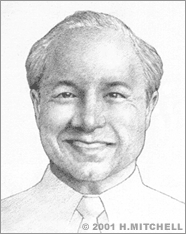Curt Civin
Curt Civin, King Fahd Professor of Oncology and Pediatrics at Johns Hopkins University, has achieved wide recognition for an important discovery he made in 1984 – a stem-cell selection process that has made more effective and less toxic cancer therapies possible.
Civin received his medical degree from Harvard Medical School in 1974, and he became a Johns Hopkins faculty member just a short time later, in 1979. He began conducting research in blood and immune system development and pursued interests in pediatric oncology and bone marrow transplantation as well.
By 1984, Civin had developed the CD34 monoclonal antibody, which made it possible for the first time to identify, isolate, and collect hematopoietic stem cells, the immature cells in the human body that grow into mature blood, marrow, and immune cells. The antibody is able to selectively capture these stem cells, which are usually located in bone marrow. Civin's discovery helped to speed up recovery time for cancer patients following high-dosage chemotherapy. Before CD34, physicians would harvest the patient's bone marrow before chemotherapy and then return it to the body. However, the transplanted bone marrow could still contain cancerous cells, which could then spread to the rest of the body. The cancer therapies also damage and often destroy blood cells and the immune system, leaving patients vulnerable to infections and other life-threatening complications.
With CD34, a patient's healthy stem cells can be harvested from the marrow and after chemotherapy, be returned to the body, where they migrate to the marrow and start producing new blood cells, renewing the body's blood and immune systems. Civin's discovery was patented and approved by the Food and Drug Administration in 1996.
Civin also invented a process that could purify cells on a large scale, isolating the rarer, more formative stem cells while weeding out the more numerous, but less desirable, mature cells. Clinical trials of the selection process began in 1990, and since that time, more than 10,000 patients have received transplants of stem cells that had been purified using Civin's monoclonal antibodies. His process is also useful in targeting stem cells for gene therapy. Additionally, being able to identify adult blood stem cells paves the way for researchers around the world to study diseases of the blood in new ways, which could help to enable future development of any number of curing therapies.
Civin has over nine U.S. patents for biomedical inventions related to his stem cell research. Johns Hopkins licensed his invention to Becton Dickinson Corp., which has sublicensed it to several other companies, including Baxter Healthcare Corp. and Nexell Therapeutics. One of Nexell’s machines, the Isolex 300i Cell Selection System, is based on Civin’s patents. Civin serves on the board of five medical journals and has published more than 135 articles. He currently serves as a professor at the University of Maryland School of Medicine, as well as the Adjunct Senior Investigator of the Pediatric Oncology Branch of the National Cancer Institute, a position that he has held since 2000.


